Featured Articles
Mayweather’s Reading Ability Belies How Smart He Is

Fighting, whether it’s boxing, wrestling or mixed martial arts, is the toughest sport known to man. Yes, all the other major sports require some form of skill, strength, toughness, stamina, speed, mental concentration and athleticism, but not to the degree that fighting or one-on- one combat does. You show me a great fighter in any combat sport and I’ll show you someone who is very smart and who is also quick to analyze and process things pertaining to situations that change in milliseconds.
No two fighters in the world fight or move alike. They are all built differently and every part of their body is different. There are other one-on-one sports, but no one is physically trying to prevent you from accomplishing what you’re trying to do with the intent to hurt or disarm. In addition to that, in most fighting confrontations, each combatant knows what the other is trying to do and vice-versa. And that makes fighting that much tougher.
Recently, rapper 50 Cent challenged Floyd Mayweather to read a page of Harry Potter, which was later downgraded to reading The Cat in the Hat on Jimmy Kimmel Live. This escalated when an audio recording of Mayweather surfaced with him reading a transcript…..”I’m Floyd Mayweather, and I’ve joined IHeartRadio for the Show Your Stripes movement to support the hiring of vets. Go to ShowYourStripes.org, a website that connects veterans with employees and helps businesses find candidates with the best training.” Mayweather’s reading didn’t flow smoothly and he certainly didn’t sound like a national news anchor reading copy.
Once the audio went viral over the internet, the venom really spewed in Floyd’s direction. He was called dumb, stupid and illiterate. Mayweather responded by posting photos of two pay checks totaling over 71 million dollars on the internet and mocked those who delighted in calling him dumb.
Only, Floyd isn’t dumb. You can’t be a great fighter and be dumb; in fact you have to be very smart and quick on your feet to be a great fighter/boxer. It requires much more than just athleticism and skill.
Muhammad Ali, the most widely known athlete, not just fighter in history, graduated at the bottom of his high school class. Yet in 1968 and only 26 years old, he went on Firing Line and held his own with conservative icon William F. Buckley, and boxing wasn’t discussed once during the 90 minute program. Buckley mentioned during one of his last interviews that Ali was one of the smartest and quickest on his feet thinkers that he ever interviewed or debated. For not being highly educated, Ali sure knew how to control the emerging new media and transform himself from a fighter who wasn’t taken all that seriously when he turned pro after winning a gold medal at the 1960 Olympics, into one of the most recognizable faces on the planet.
Ali was a great communicator and understood people. He also understood psychology and worked his big name opponents to death before their in-ring confrontations. He also grasped that the quickest way to reduce great fighters to their lowest common denominator was to get them mad. This is evidenced by how many boxers have looked anything like professional fighters when getting into it at a press conference. Or how MMA fighters Jon Jones and future opponent Daniel Cormier looked flailing away at each other during their recent confrontation at a press conference. Isn’t it amazing how much better a fighter’s technique and skill come out when they aren’t mad? In all of Ali’s 61 fights, it’s safe to say that his antics had the least effect on Ken Norton and Jimmy Young as far as name opponents go. He tried everything in his book but never unraveled them once. Maybe he realized they were a tough style match-up for him, but they added to his degree of difficulty by not getting mad and keeping their cool during their bouts with him.
Everyone knows that Ali wasn’t book smart or very educated, but he was a very smart man and more than held his own in and out of the ring with all those he crossed paths with. He barely got out of high school yet was asked to give lectures not pertaining to boxing at Oxford and some of the highest learning institutions in the world.
How about Bernard Hopkins. He spent almost five years in prison and didn’t graduate high school. Has there ever been a better self-managed athlete in any sport? If so, I don’t know of them. Hopkins wasn’t a gold medalist, doesn’t necessarily have a fan friendly style, he’s not the kid next door, and he didn’t have any corporate or establishment money working behind the scenes trying to advance his career. In fact, once he captured the middleweight title, the establishment was trying to knock him off, and he was smart enough to see it. That’s why he never got out of shape and kept his eye on every fighter who he knew he’d one day most likely have to defend the title against. Hopkins was also smart enough to learn the business of boxing, insuring that he wouldn’t get ripped off and taken advantage of like many other past great fighters were.
And when it comes to ring combat, Hopkins is as smart as they come. He’s great at understanding his opponents’ strengths and weaknesses and usually takes away their strengths and forces them to fight from their weakness. On top of that he’s earning some of his biggest pay days and enhancing his legacy at the end of his career. How many athletes can that be said about? No, Bernard will not be getting calls to read radio spots once he finally retires, but he’s every bit as smart and intellectual as the guy writing them.
What about Floyd Mayweather? In Floyd you have a fighter who isn’t a former gold medalist, he doesn’t have natural charisma, he’s not the best boxer you’ve ever seen, nor is he the fastest or the hardest puncher. If that weren’t enough, he has a reputation of not fighting the toughest and most worthy opposition when they are at their most dangerous. His managerial skills as far as picking opponents are every bit as good as his ring skill. Actually, they are better because he’s one of the top three fighter-managers ever.
Floyd realized around the time that he fought Oscar De La Hoya, in mid 2007, that he couldn’t be promoted as the kid next door like Oscar. He also didn’t possess flashy and blow you away skill like Sugar Ray Leonard or Roy Jones, and he wasn’t a destroyer like Thomas Hearns. So what did he do? He transformed himself into the ultimate cocky bad guy who, in the style of a WWE wrestler, relishes playing the villain. And all that has done has made him the highest paid athlete in the world the last two years, and that’s without making one cent from endorsements like Peyton Manning, LeBron James and Tiger Woods.
Mayweather has never taken a beating in any fight, so he’ll retire with his health and wealth. This leads me to conclude that for a guy who some say isn’t too smart because he may be moderately illiterate, he’s done really well for himself. Remember, he can be taught to read like everyone reading this was… However, we could never be taught or learn to fight like he can. And there’s no such thing as a great fighter who isn’t a very smart and shrewd person.
Fighting is the hardest thing to do athletically. To be a great one you must be a very quick thinker and not only process information quickly, but you also must have the capacity to apply what’s needed and throw away what doesn’t apply, all in a moment’s notice. Floyd Mayweather may not be the guy you want to read advertising copy, but he sure is one smart man.
Frank Lotierzo can be contacted at GlovedFist@Gmail.com
Featured Articles
Avila Perspective, Chap. 322: Super Welter Week in SoCal
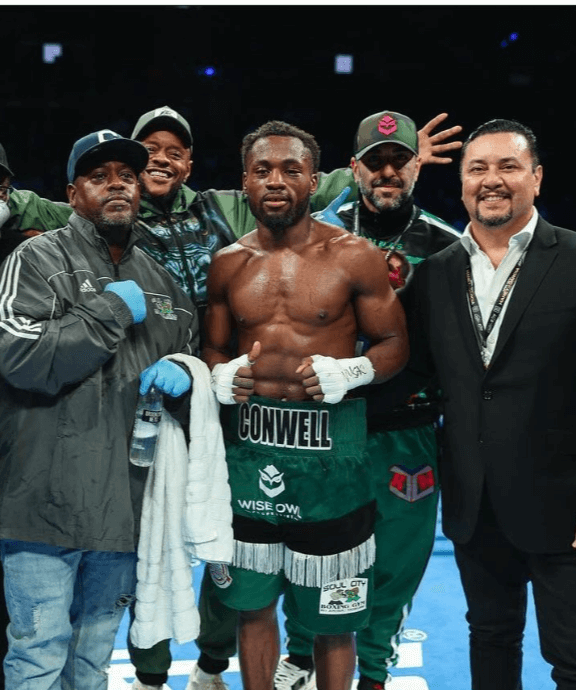
Two below-the-radar super welterweight stars show off their skills this weekend from different parts of Southern California.
One in particular, Charles Conwell, co-headlines a show in Oceanside against a hard-hitting Mexican while another super welter star Sadriddin Akhmedov faces another Mexican hitter in Commerce.
Take your pick.
The super welterweight division is loaded with talent at the moment. If Terence Crawford remained in the division he would be at the top of the class, but he is moving up several weight divisions.
Conwell (21-0, 16 KOs) faces Jorge Garcia Perez (32-4, 26 KOs) a tall knockout puncher from Los Mochis at the Frontwave Arena in Oceanside, Calif. on Saturday April 19. DAZN will stream the Golden Boy Promotions card that also features undisputed flyweight champion Gabriela Fundora. We’ll get to her later.
Conwell might be the best super welterweight out there aside from the big dogs like Vergil Ortiz, Serhii Bohachuk and Sebastian Fundora.
If you are not familiar with Conwell he comes from Cleveland, Ohio and is one of those fighters that other fighters know about. He is good.
He has the James “Lights Out” Toney kind of in-your-face-style where he anchors down and slowly deciphers the opponent’s tools and then takes them away piece by piece. Usually it’s systematic destruction. The kind you see when a skyscraper goes down floor by floor until it’s smoking rubble.
During the Covid days Conwell fought two highly touted undefeated super welters in Wendy Toussaint and Madiyar Ashkeyev. He stopped them both and suddenly was the boogie man of the super welterweight division.
Conwell will be facing Mexico’s taller Garcia who likes to trade blows as most Mexican fighters prefer, especially those from Sinaloa. These guys will be firing H bombs early.
Fundora
Co-headlining the Golden Boy card is Gabriela Fundora (15-0, 7 KOs) the undisputed flyweight champion of the world. She has all the belts and Mexico’s Marilyn Badillo (19-0-1, 3 KOs) wants them.
Gabriela Fundora is the sister of Sebastian Fundora who holds the men’s WBC and WBO super welterweight world titles. Both are tall southpaws with power in each hand to protect the belts they accumulated.
Six months ago, Fundora met Argentina’s Gabriela Alaniz in Las Vegas to determine the undisputed flyweight champion. The much shorter Alaniz tried valiantly to scrap with Fundora and ran into a couple of rocket left hands.
Mexico’s Badillo is an undefeated flyweight from Mexico City who has battled against fellow Mexicans for years. She has fought one world champion in Asley Gonzalez the current super flyweight world titlist. They met years ago with Badillo coming out on top.
Does Badillo have the skill to deal with the taller and hard-hitting Fundora?
When a fighter has a six-inch height advantage like Fundora, it is almost impossible to out-maneuver especially in two-minute rounds. Ask Alaniz who was nearly decapitated when she tried.
This will be Badillo’s first pro fight outside of Mexico.
Commerce Casino
Kazakhstan’s Sadriddin Akhmedov (15-0, 13 KOs) is another dangerous punching super welterweight headlining a 360 Promotions card against Mexico’s Elias Espadas (23-6, 16 KOs) on Saturday at the Commerce Casino.
UFC Fight Pass will stream the 360 Promotions card of about eight bouts.
Akhmedov is another Kazakh puncher similar to the great Gennady “GGG” Golovkin who terrorized the middleweight division for a decade. He doesn’t have the same polish or dexterity but doesn’t lack pure punching power.
It’s another test for the super welterweight who is looking to move up the ladder in the very crowded 154-pound weight division. 360 Promotions already has a top contender in Ukraine’s Serhii Bohachuk who nearly defeated Vergil Ortiz a year ago.
Could Bohachuk and Akhmedov fight each other if nothing else materializes?
That’s a question for another day.
Fights to Watch
Sat. DAZN 5 p.m. Charles Conwell (21-0, 16 KOs) vs. Jorge Garcia Perez (32-4, 26 KOs); Gabriela Fundora (15-0) vs Marilyn Badillo (19-0-1).
Sat. UFC Fight Pass 6 p.m. Sadriddin Akhmedov (15-0) vs Elias Espadas (23-6).
To comment on this story in the Fight Forum CLICK HERE
Featured Articles
TSS Salutes Thomas Hauser and his Bernie Award Cohorts
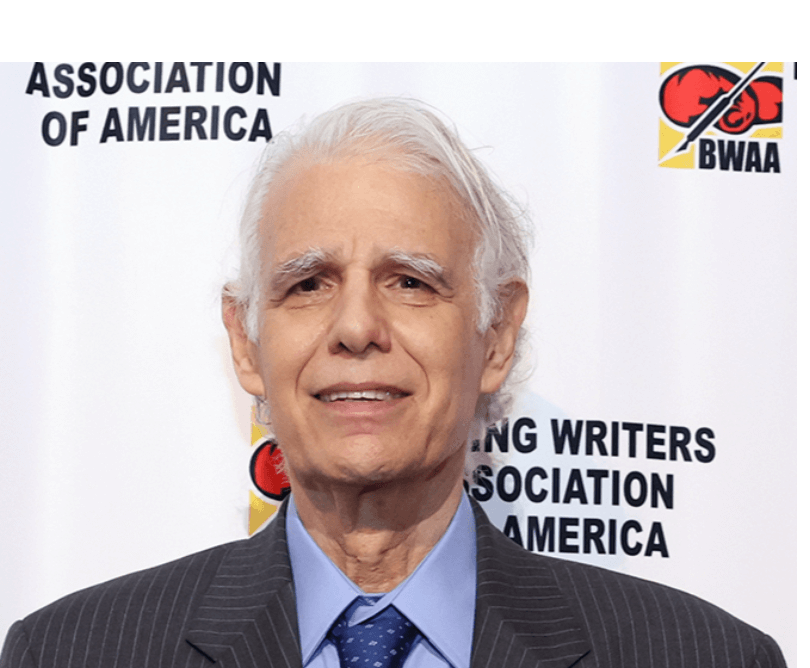
The Boxing Writers Association of America has announced the winners of its annual Bernie Awards competition. The awards, named in honor of former five-time BWAA president and frequent TSS contributor Bernard Fernandez, recognize outstanding writing in six categories as represented by stories published the previous year.
Over the years, this venerable website has produced a host of Bernie Award winners. In 2024, Thomas Hauser kept the tradition alive. A story by Hauser that appeared in these pages finished first in the category “Boxing News Story.” Titled “Ryan Garcia and the New York State Athletic Commission,” the story was published on June 23. You can read it HERE.
Hauser also finished first in the category of “Investigative Reporting” for “The Death of Ardi Ndembo,” a story that ran in the (London) Guardian. (Note: Hauser has owned this category. This is his 11th first place finish for “Investigative Reporting”.)
Thomas Hauser, who entered the International Boxing Hall of Fame with the class of 2019, was honored at last year’s BWAA awards dinner with the A.J. Leibling Award for Outstanding Boxing Writing. The list of previous winners includes such noted authors as W.C. Heinz, Budd Schulberg, Pete Hamill, and George Plimpton, to name just a few.
The Leibling Award is now issued intermittently. The most recent honorees prior to Hauser were Joyce Carol Oates (2015) and Randy Roberts (2019).
Roberts, a Distinguished Professor of History at Purdue University, was tabbed to write the Hauser/Leibling Award story for the glossy magazine for BWAA members published in conjunction with the organization’s annual banquet. Regarding Hauser’s most well-known book, his Muhammad Ali biography, Roberts wrote, “It is nearly impossible to overestimate the importance of the book to our understanding of Ali and his times.” An earlier book by Hauser, “The Black Lights: Inside the World of Professional Boxing,” garnered this accolade: “Anyone who wants to understand boxing today should begin by reading ‘The Black Lights’.”
A panel of six judges determined the Bernie Award winners for stories published in 2024. The stories they evaluated were stripped of their bylines and other identifying marks including the publication or website for which the story was written.
Other winners:
Boxing Event Coverage: Tris Dixon
Boxing Column: Kieran Mulvaney
Boxing Feature (Over 1,500 Words): Lance Pugmire
Boxing Feature (Under 1,500 Words): Chris Mannix
The Dixon, Mulvaney, and Pugmire stories appeared in Boxing Scene; the Mannix story in Sports Illustrated.
The Bernie Award recipients will be honored at the forthcoming BWAA dinner on April 30 at the Edison Ballroom in the heart of Times Square. (For more information, visit the BWAA website). Two days after the dinner, an historic boxing tripleheader will be held in Times Square, the logistics of which should be quite interesting. Ryan Garcia, Devin Haney, and Teofimo Lopez share top billing.
To comment on this story in the Fight Forum CLICK HERE
Featured Articles
Mekhrubon Sanginov, whose Heroism Nearly Proved Fatal, Returns on Saturday
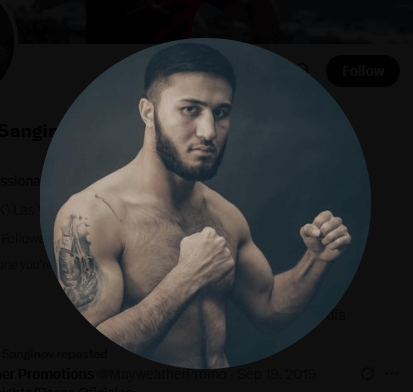
To say that Mekhrubon Sanginov is excited to resume his boxing career would be a great understatement. Sanginov, ranked #9 by the WBA at 154 pounds before his hiatus, last fought on July 8, 2022.
He was in great form before his extended leave, having scored four straight fast knockouts, advancing his record to 13-0-1. Had he remained in Las Vegas, where he had settled after his fifth pro fight, his career may have continued on an upward trajectory, but a trip to his hometown of Dushanbe, Tajikistan, turned everything haywire. A run-in with a knife-wielding bully nearly cost him his life, stalling his career for nearly three full years.
Sanginov was exiting a restaurant in Dushanbe when he saw a man, plainly intoxicated, harassing another man, an innocent bystander. Mekhrubon intervened and was stabbed several times with a long knife. One of the puncture wounds came perilously close to puncturing his heart.
“After he stabbed me, I ran after him and hit him and caught him to hold for the police,” recollects Sanginov. “There was a lot of confusion when the police arrived. At first, the police were not certain what had happened.
“By the time I got to the hospital, I had lost two liters of blood, or so I was told. After I was patched up, one of the surgeons said to me, ‘Give thanks to God because he gave you a second life.’ It is like I was born a second time.”

“I was in the wrong place at the wrong time. It could have happened in any city,” he adds. (A story about the incident on another boxing site elicited this comment from a reader: “Good man right there. World would be a better place if more folk were willing to step up when it counts.”)
Sanginov first laced on a pair of gloves at age 10 and was purportedly 105-14 as an amateur. Growing up, the boxer he most admired was Roberto Duran. “Muhammad Ali will always be the greatest and [Marvin] Hagler was great too, but Duran was always my favorite,” he says.
During his absence from the ring, Sanginov married a girl from Tajikistan and became a father. His son Makhmud was born in Las Vegas and has dual citizenship. “Ideally,” he says, “I would like to have three more children. Two more boys and the last one a daughter.”
He also put on a great deal of weight. When he returned to the gym, his trainer Bones Adams was looking at a cruiserweight. But gradually the weight came off – “I had to give up one of my hobbies; I love to eat,” he says – and he will be resuming his career at 154. “Although I am the same weight as before, I feel stronger now. Before I was more of a boy, now I am a full-grown man,” says Sanginov who turned 29 in February.
He has a lot of rust to shed. Because of all those early knockouts, he has answered the bell for only eight rounds in the last four years. Concordantly, his comeback fight on Saturday could be described as a soft re-awakening. Sanginov’s opponent Mahonri Montes, an 18-year pro from Mexico, has a decent record (36-10-2, 25 KOs) but has been relatively inactive and is only 1-3-1 in his last five. Their match at Thunder Studios in Long Beach, California, is slated for eight rounds.
On May 10, Ardreal Holmes (17-0) faces Erickson Lubin (26-2) on a ProBox card in Kissimmee, Florida. It’s an IBF super welterweight title eliminator, meaning that the winner (in theory) will proceed directly to a world title fight.
Sanginov will be watching closely. He and Holmes were scheduled to meet in March of 2022 in the main event of a ShoBox card on Showtime. That match fell out when Sanginov suffered an ankle injury in sparring.
If not for a twist of fate, that may have been Mekhrubon Sanginov in that IBF eliminator, rather than Ardreal Holmes. We will never know, but one thing we do know is that Mekhrubon’s world title aspirations were too strong to be ruined by a knife-wielding bully.
To comment on this story in the Fight Forum CLICK HERE
-
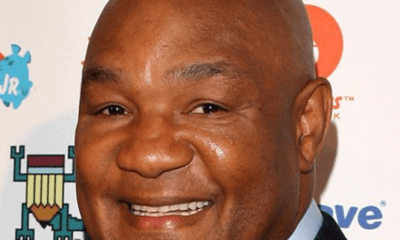
 Featured Articles4 weeks ago
Featured Articles4 weeks agoBernard Fernandez Reflects on His Special Bond with George Foreman
-
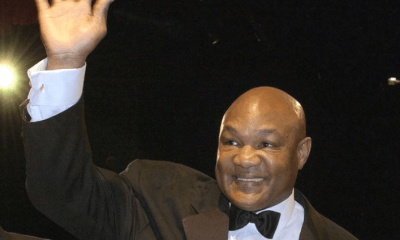
 Featured Articles4 weeks ago
Featured Articles4 weeks agoA Paean to George Foreman (1949-2025), Architect of an Amazing Second Act
-
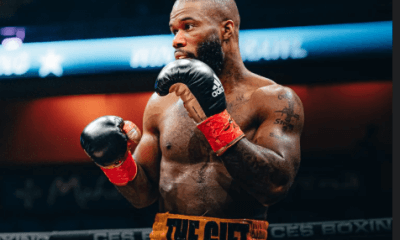
 Featured Articles4 weeks ago
Featured Articles4 weeks agoSpared Prison by a Lenient Judge, Chordale Booker Pursues a World Boxing Title
-
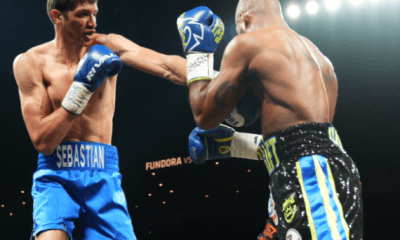
 Featured Articles4 weeks ago
Featured Articles4 weeks agoSebastian Fundora TKOs Chordale Booker in Las Vegas
-
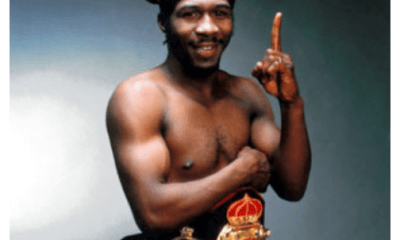
 Featured Articles3 weeks ago
Featured Articles3 weeks agoBoxing Odds and Ends: The Wacky and Sad World of Livingstone Bramble and More
-
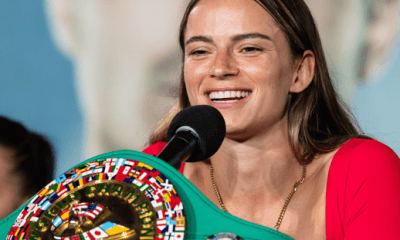
 Featured Articles4 weeks ago
Featured Articles4 weeks agoAvila Perspective, Chap. 318: Aussie Action, Vegas and More
-
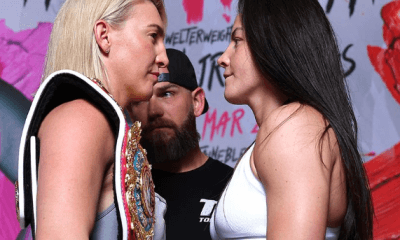
 Featured Articles3 weeks ago
Featured Articles3 weeks agoAvila Perspective, Chap. 319: Rematches in Las Vegas, Cancun and More
-

 Featured Articles3 weeks ago
Featured Articles3 weeks agoRingside at the Fontainebleau where Mikaela Mayer Won her Rematch with Sandy Ryan
















